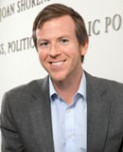NBC’s Betsy Fischer Martin sees future of media built on partnerships between social media and news organizations
October 22, 2013 – The Shorenstein Center welcomed Betsy Fischer Martin, managing editor of NBC News Political Programming and former senior executive producer of “Meet the Press,” to share her thoughts on the changing media landscape. During her 20-year tenure at “Meet the Press,” Fischer Martin said, technology changed the show considerably. Her job when she started as […]




